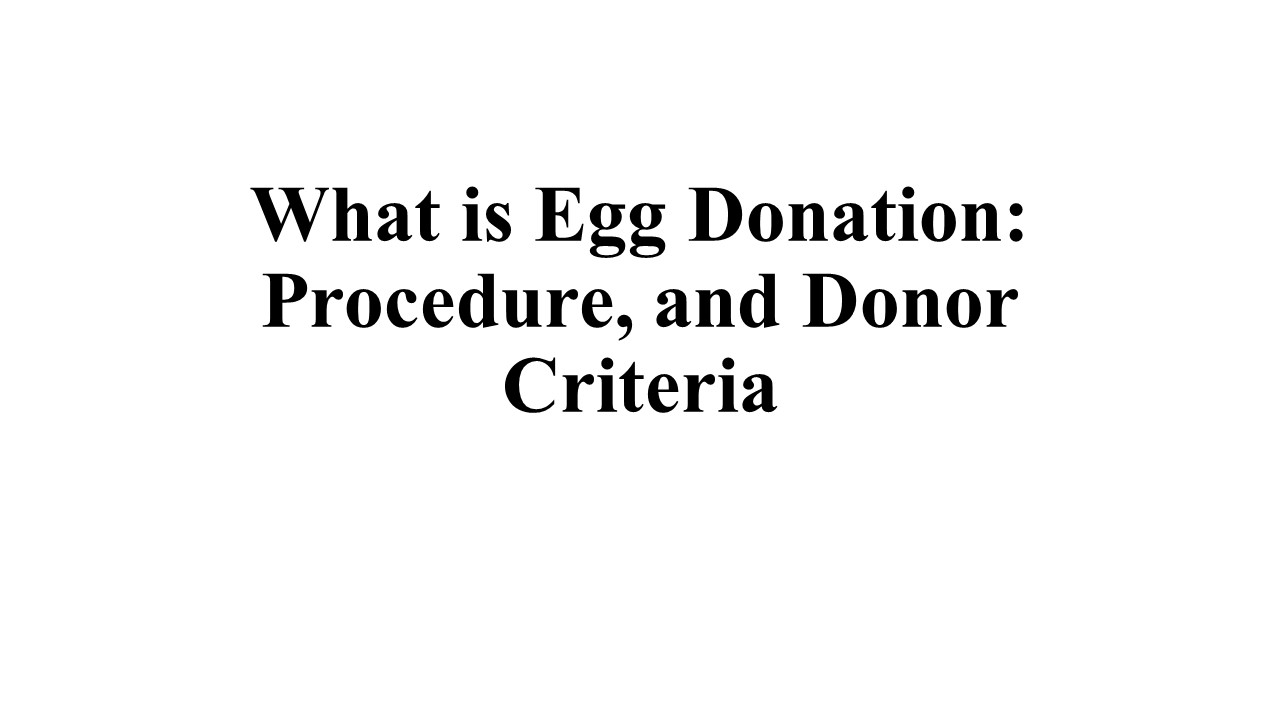What is Egg Donation: Procedure, and Donor Criteria - PowerPoint PPT Presentation
Title:
What is Egg Donation: Procedure, and Donor Criteria
Description:
A woman can help another woman in having a baby by donating her eggs (or oocytes). It is a part of assisted reproduction and is a fantastic family-building option for couples in which the female suffers from severe gamete production problems. Couples who are carriers of hereditary diseases but do not want to pass their disease on to their offspring can also donate their eggs. The Indian Council of Medical Research says that egg donation should be a private process and that the donor should undergo a thorough examination before her eggs are used. – PowerPoint PPT presentation
Number of Views:1
Title: What is Egg Donation: Procedure, and Donor Criteria
1
What is Egg Donation Procedure, and Donor
Criteria
2
What is Egg Donation?
- A woman can help another woman in having a baby
by donating her eggs (or oocytes). - It is a part of assisted reproduction and is a
fantastic family-building option for couples in
which the female suffers from severe gamete
production problems. - Couples who are carriers of hereditary diseases
but do not want to pass their disease on to their
offspring can also donate their eggs. - The Indian Council of Medical Research says that
egg donation should be a private process and that
the donor should undergo a thorough examination
before her eggs are used.
3
Benefits of Egg Donation
- The following are some benefits of egg donation
that should be taken into consideration - A couple who wanted to start a family but was
unable to do so for personal or medical reasons
will be able to receive the gift of parenthood
from the female. - Given that donors undergo a set of tests to rule
out any genetic or infectious diseases prior to
donation, it enables the female egg donor to get
free medical testing. - Donating eggs has financial benefits in addition
to being a kind deed.
4
- The female is made aware of her potential for
conception. Additionally, the clinics encourage
women to freeze their eggs as well, which may be
useful in the future. - It may allow the female to become involved in the
life of the child whose birth was made possible
by her decision to donate eggs.
5
What are the Types of Donors?
- In some countries, egg donors are not related to
patients. They do it mainly for financial
support. However, the patient has the option to
choose their own donor from among their friends
or relatives. - In India, donors can be anonymous, semi-anonymous
or even met. - It is determined by both the donor and the
recipient.
6
Who is it intended for?
- Mature or menopausal women.
- Adoptive couples who are unable to adopt.
- If a woman is unable to conceive after IVF or
ICSI, she can opt for egg donation. - Oocyte donation is the best option for women with
ovarian failure or undergoing radiation or
chemotherapy. - If a woman has a chromosomal defect, she may
choose to have this procedure to prevent her
children from inheriting the genetic condition. - If the patient has tuberculosis or endometriosis,
the quality of eggs may be low, making egg
donation a viable option.
7
Screening Procedure the Donors
- The eggs are usually taken from women between the
ages of 30 and 35. - These women are not only healthy, but they are
also free of any illnesses or genetic disorders. - Women are screened for AIDS and hepatitis at
fertility clinics. - Donor's marital status is not required.
- A donor who is already pregnant is preferred as
it confirms her ability to bear children.
8
Egg Donation Procedure
- The recipient's and donor's cycles should be in
sync. When this occurs, the fresh embryo is
transferred. - The doctor may prescribe medications to ensure
that the cycles are in sync. - The donor is injected during the procedure in
order to produce a large number of eggs. - When the eggs are mature enough, she is given
local anesthesia to ensure the transfer. - No surgery is required to remove the eggs from
the vagina. - The eggs are then fertilized in a laboratory with
the male partner's sperm. This can be completed
through IVF or ICSI.
9
- After two days of incubation, the fertilized egg
develops into a four-celled embryo. - On day three, an eight-cell embryo develops, and
after five days, you get a multicellular
blastocyst. - On any of these days, the egg is likely to enter
the uterus.































